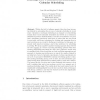Free Online Productivity Tools
i2Speak
i2Symbol
i2OCR
iTex2Img
iWeb2Print
iWeb2Shot
i2Type
iPdf2Split
iPdf2Merge
i2Bopomofo
i2Arabic
i2Style
i2Image
i2PDF
iLatex2Rtf
Sci2ools
102
click to vote
PATAT
2004
Springer
2004
Springer
Learning User Preferences in Distributed Calendar Scheduling
Abstract. Within the field of software agents, there has been increasing interest in automating the process of calendar scheduling in recent years. Calendar (or meeting) scheduling is an example of a timetabling domain that is most naturally formulated and solved as a continuous, distributed problem. Fundamentally, it involves reconciliation of a given user’s scheduling preferences with those of others that the user needs to meet with, and hence techniques for eliciting and reasoning about a user’s preferences are crucial to finding good solutions. In this paper, we present work aimed at learning a user’s time preference for scheduling a meeting. We adopt a passive machine learning approach that observes the user engaging in a series of meeting scheduling episodes with other meeting participants and infers the user’s true preference model from accumulated data. After describing our basic modeling assumptions and approach to learning user preferences, we report the results obt...
Education | Meeting Scheduling | PATAT 2004 | User’s Scheduling Preferences | User’s True Preference |
Related Content
| Added | 02 Jul 2010 |
| Updated | 02 Jul 2010 |
| Type | Conference |
| Year | 2004 |
| Where | PATAT |
| Authors | Jean Oh, Stephen F. Smith |
Comments (0)

